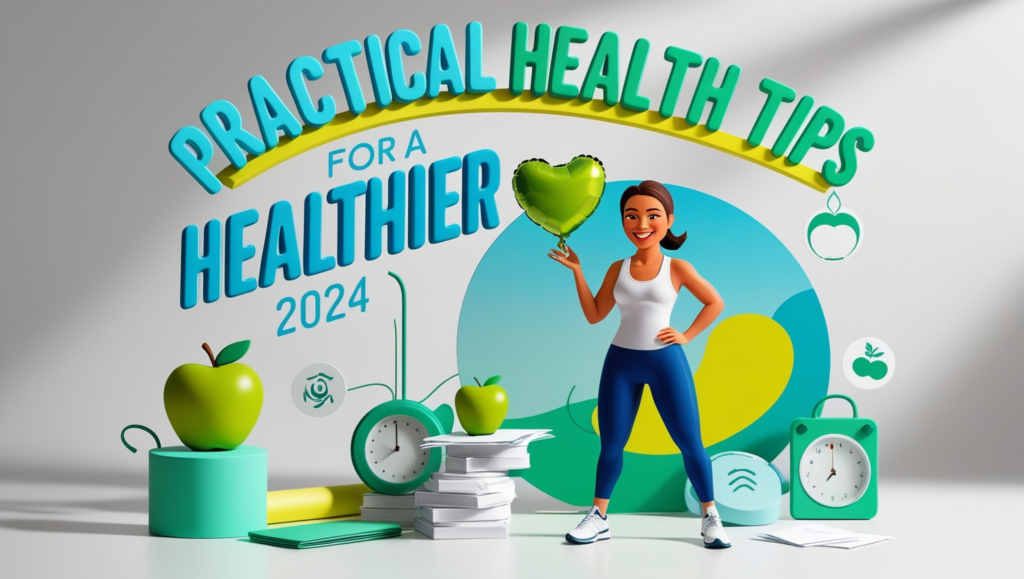Living Healthly Should not be Expensive or Tough. Sometimes Making a Few Changes to your day-to-day life will make you Healthier than ever, so in this blog, we will give you 13 Tips for a healthier 2024 (Lifestyle) for a healthy life,
The start of a new decade brings fresh resolutions for a healthier lifestyle. Here are some practical health tips to help you start toward healthy living in 2024:

Table of Contents
Tips for Healthy Habits in 2024 ⬇️

1. Eat a Balanced Diet
Incorporate a variety of foods into your meals, including fruits, vegetables, legumes, nuts, and whole grains. Aim for at least five servings (400g) of fruits and vegetables each day. Enhance your fruit and vegetable intake by including them in your meals, snacking on fresh produce, eating a variety, and choosing seasonal options. A nutritious diet helps lower the risk of malnutrition and non-communicable diseases (NCDs) such as diabetes, heart disease, stroke, and cancer.
➡️Healthy Foods to Eat Every Day: Nourishing Your Body for Optimal Well-being
2. Cut Down on Salt and Sugar
Excessive sodium intake is common and increases the risk of high blood pressure, heart disease, and stroke. Limit salt intake to 5g per day (about one teaspoon). This can be achieved by using less salt, soy sauce, and other high-sodium condiments in your meals; avoiding salty snacks, and choosing low-sodium products.
Consuming too much sugar leads to tooth decay and unhealthy weight gain. Both adults and children should reduce free sugar intake to less than 10% of total energy intake, which equals about 50g or 12 teaspoons for an adult. Aim for less than 5% of total energy intake for additional health benefits. Reduce sugar consumption by limiting sugary snacks, candies, and sugar-sweetened beverages.
3. Limit Harmful Fats
Keep fats to less than 30% of your energy intake to prevent unhealthy weight gain and NCDs. Opt for unsaturated fats (in fish, avocado, nuts, and oils like sunflower, soybean, canola, and olive) over saturated fats and trans-fats. Saturated fats are in fatty meat, butter, palm and coconut oil, cream, cheese, ghee, and lard, while trans-fats are in baked and fried foods, pre-packaged snacks, and cooking oils.
4. Avoid Harmful Alcohol Use
There is no safe level of alcohol consumption. Drinking can lead to health problems such as mental and behavioral disorders, alcohol dependence, liver cirrhosis, certain cancers, heart diseases, and injuries from violence and road accidents.
5. Don’t Smoke
Smoking causes NCDs like lung disease, heart disease, and stroke. Tobacco harms not only smokers but also non-smokers through second-hand smoke. If you smoke, quitting will provide immediate and long-term health benefits. If you don’t smoke, don’t start and advocate for smoke-free environments.
6. Stay Physically Active
Physical activity includes any movement produced by skeletal muscles that requires energy, like exercise, household chores, and recreational activities. Adults aged 18-64 should aim for at least 150 minutes of moderate-intensity physical activity per week. For extra health benefits, increase this to 300 minutes per week.
7. Regular Blood Pressure Checks
Hypertension is a “silent killer” because it often has no symptoms. Regular blood pressure checks are essential as uncontrolled hypertension can lead to heart, brain, kidney, and other diseases. If your blood pressure is high, follow your health worker’s advice to manage it.
8. Get Tested
Testing is crucial to know your health status, especially for HIV, hepatitis B, sexually transmitted infections (STIs), and tuberculosis (TB). Early detection and treatment can prevent serious complications and death. Visit a public or private health facility for testing.
9. Stay Vaccinated
Vaccination is a powerful way to prevent diseases. Vaccines protect against illnesses like cervical cancer, cholera, diphtheria, hepatitis B, influenza, measles, mumps, pneumonia, polio, rabies, rubella, tetanus, typhoid, and yellow fever. In the Philippines, children under one year old receive free vaccines through the Department of Health’s immunization program. Adolescents and adults should consult their doctors about their vaccination status.
10. Practice Safe Sex
Safe sexual practices are important for overall health and well-being. Use measures like pre-exposure prophylaxis (PrEP) for HIV and condoms to prevent HIV and other STIs such as gonorrhea and syphilis.
11. Cover Your Mouth When Coughing or Sneezing
Infections like influenza, pneumonia, and tuberculosis spread through airborne droplets when an infected person coughs or sneezes. Cover your mouth with a tissue or your elbow, or wear a face mask to prevent spreading germs.
12. Prevent Mosquito Bites
Mosquitoes transmit diseases such as dengue, chikungunya, malaria, and lymphatic filariasis. Protect yourself by wearing light-colored, long-sleeved clothing, using insect repellent, and ensuring your home is mosquito-proof. If traveling to areas with mosquito-borne diseases, consult a physician about vaccines and preventive measures.
13. Drink Safe Water
Consuming unsafe water can lead to diseases like cholera, diarrhea, hepatitis A, typhoid, and polio. Ensure your water is safe by checking with local suppliers or boiling it for at least one minute. Let it cool naturally before drinking.
